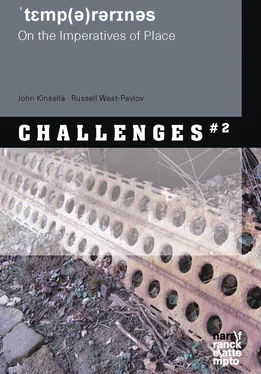and:
It was during these years that she wrote her poems. Some time in the early sixties, she met and formed here a great friendship with the late Archdeacon Brown and his wife. The latter was a daughter of the Rev. A. Mitchell, and the former was at that time Rector of the Parish of York, and editor of the Church Magazine. It was in accordance with his wish, and under his encouragement, that she allowed her verses to be published in his magazine under the nom de plume of “E.” Some years later, an uncle of hers in Edinburgh, perchancing to see the Church Magazine, was much struck with the beauty of the poems, and, collecting them, re-published them in pamphlet form for family circulation.
Mrs. Brockman was of a cheerful and buoyant disposition, but at this time of her life, grief for the loss of her much loved relations, and the many trials and difficulties inseparable from the rearing of a young family—in those days of early colonial settlement—had for a time greatly injured her health, which for some years was very precarious. Her poems were the children of heartache and solitude, and a deep note of sorrow runs through most of them, but her strong religious convictions and the firm faith in God which upheld her through all the trials of her life, is the key note of every one.
This might not be one of the greatest poems in the language, and it does fit a template of similar poems written out of the colonies with a longing for the absent family and the markers of the Old World, but it is different because of where it comes from and when it was written in that place. Context is everything, sure, but it’s even more than everything here. It’s a counter to the rules she lived by, the patterns of behaviour she chose to observe and uphold. No glittering poet’s-fame for her: just a connection with her own alienation reconfigured into an expression of the loss she certainly felt but also helped create.
In some ways, this is a tragic poem of chronic depression, the crisis of the colonial subject and the subjectivity of being a ‘poetess’, and of searching for consolation where no consolation was or could be morally available. It is a poem, to my mind, of what I’d call temporariness and schism in belonging. What is ‘lost’ is permanently lost. Old memorials are the false memorials over the killing fields of the colonised land.
JK

Skyping the other day with John in Cork—an approximation of proximity, that taught me a thing or two. Proximity drives creativity—that’s why we both miss the back-and-forth of discussion, each interrupting the other, both of us constantly veering away from the topic in a productive clinamen.
Proximity is not just the exchange of ideas, it’s an exchange of energy that generates ideas in a way that is more than just intellect. In a slow recognition of this, there’s a growing impetus in literary critical studies of the importance of what is called affect—collective, interpersonal, bodily-based emotion—in the work of creative thought. This tells us that ideas are a material process, that thinking uses up energy and emits energy, and that other thinking beings are energized by that energy, in turn pumping out energy-ideas…
For much of human epistemic history, knowledge was carnal. To know was to pay close attention to the world, with ‘close’ being the operative word. Words were part of the ‘prose of the world’, and to imitate in art was somehow to enter into a contagious contact with the object imitated (Taussig 1993). Then came the Enlightenment, sundering nature and culture, things and humans, and replacing intimacy with distance as the guarantor of true knowledge. Cut free of their moorings in the natural world, humans received a mandate to know that world in ways that were closely related to an instrumental exploitation of everything that was non-human (and quite a lot that was human but could conveniently be deemed sub-human if expediency deemed necessary). Language ceased to be a way of communing with the world, and became instead, a means of categorizing and describing it, with communication reserved for humans among themselves. The results of this history of instrumental reason are now becoming unmistakeably clear to us as the climate spirals out of control and threatens to take its revenge not only on the wider and wider swathes of the earth’s population living in poverty and precarity, but also large numbers of those at the top of the socio-economic ladder.
Unsurprisingly then, the double functions of language in modern literary studies, those of description and derision, documentation and critique, both predicated on distance between the writing self and the object of writerly discourse, are slowly being overhauled today by something that looks like a resurgent aesthetics of proximity. Omniscient narration or anti-ideological demystification are losing ground to, if not totally displaced by, emergent paradigms of literary creation that depend upon proximity and the sort of contagious effect that goes under the name of ‘affect’. Much of this thinking has come from our colleagues in the Global South, where creative art, whether it be dance, theatre, or performance poetry, has never ceased to work in a mode of proximity, even as it has invested the more distanced medial forms of the published book or other manifestations of the work of art in an age of mechanical reproduction. Literary aesthetics in Africa has a respectable political pedigree under the aegis of what our Cape Town colleague Harry Garuba (2003: 276) calls the ‘referential imperative’; but it has an even longer history of working according to the dicates of what, in opposition to critical realism, he terms ‘animist realism’ (ibid: 267, 274, 284). This is a form of literary creation that is implied in a ‘continual re-enchantment of the world’ (ibid: 265). Examples of this ‘animist realism’ can be seen in Ghanian dramatist Joe de Graft’s call, in theatrical performance, for a form of aesthetic practice that would spurn ‘verisimilitude’ and manifest, rather, ‘the non-linguistic behaviour and attributes’ of fictional characters, ‘their bodies. ... And the appetites that drive them’, but also ‘their environment and what it is charged with—its dynamic’ (de Graft 1974: 37-8). Sam Durrant notes that this form of proximate, worldly literary creation, in which words and objects and multi-species actors are intimately entangled with one another does not merely represent life in the postcolony, but ‘invests’ in that life via a mode of ‘enchantment’ that makes of the literary text a ‘transformational rite’ (2018, forthcoming). This ‘post-representational’ mode of writing (Thrift 2008) activates literary creation in ways that unleash its powers via the medium of affect—an im-mediate mode of taking-effect that works within spaces of proximity and tactile contact rather than the cerebral and haughty distance of critique.
But isn’t this all a bit far-fetched? This is all very well for our colleagues in Cape Town, but aren’t West-of-Ireland Cork and Protestant-Reformation Tübingen both anchored firmly in the Global North, the hemisphere of technological progress and stern rationality? After all, for god’s sake, it’s skype that is connecting us at this distance! But both of these places have their own distinct genius loci—that’s what leads John there, and holds me here, in any case—and persons like sites have their own interlinked spirit of place, the creativity that emerges when their paths cross and their orbits overlap.
That skype session led to this piece. Indeed, many other chats, viva voce and otherwise proximate, some sitting in the office that overlooks the Österberg, others walking through the forests around Tübingen, others via the mode of written dialogue and the secret magic of words, have led to this book. The proof of proximity is in the producing.
Читать дальше













